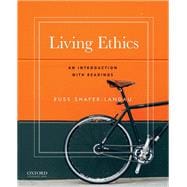Living Ethics: An Introduction with Readings is an ideal all-in-one resource for courses in introduction to ethics and contemporary moral problems. In this hybrid textbook/reader, Russ Shafer-Landau brings moral theory and contemporary moral issues to life with a comprehensive and balanced set of readings, uniquely engaging explanations, and clear analysis of arguments.
The book balances coverage of moral reasoning (in Part 1) with highly relevant contemporary moral problems (in Part 2).
Part 2 also features a rich collection of pedagogical tools to help students understand and think critically about the various contemporary moral issues discussed:
* Just the Facts: Provides students with relevant factual material, offering necessary background for the book's ethical investigations
* Argument Analysis: Reconstructs and critically assesses a battery of arguments on the topics of the chapter
* Essential Concepts: Key terms that are placed in bold on first mention in the text (also available in the glossary)
* Stat Shots: Visual presentations of quantitative data provide additional context for the chapter's subject matter
* Cases for Critical Thinking: Often taken from headlines, these exercises are designed to invite deeper reflection on issues related to the chapter topic








